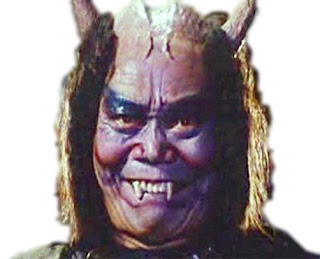Folklore additions
 |
| The Crow Demon – part of Chinese myth [Source*] |
Mahayana and Theravada differences
The Buddhists who follow the "purer" Theravadin path say that this is the long way to salvation, and that failing to attempt to correct imperfect interpretations of the human condition is a dereliction of duty.
The Mahayana response is to point out that in attempting to correct those views, confusion is also bound to arise if the Buddhist devotee is not intellectually or spiritually ready to accept the more sophisticated approach. Consequently, gods and demons exist for as long as people need to believe in them.
Violence?
In Buddhism, the boundaries between life and death, so stark in the Western tradition, are not so absolute. Death is no more than a transition to a new state of being. In destruction, something new is inevitably created.
 |
| Yulan demon [Source*] |
So it is with Monkey, and perhaps this is a partial resolution at least of the contradiction apparent in the violent scenes so fascinating to many of the children. Why then, does Tripitaka denounce Monkey's killing of demons?
The Ultimate Message
 |
| Calling up the Cloud Chariot [Source*] |
As Tripitaka would say, let them disappear by themselves, at the appropriate time, merely by correcting our perception of the nature of this world. The taking of life in any form is a violation of the laws of karma, a crime against the universe. There is no justification in Buddhism strong enough for that, and no encouragement should be given to any tendencies which promote slaughter.
 |
| Tripitaka as we know him best [Source*] |
Monkey, Pigsy and Sandy are the latent strengths and weaknesses within that same self; pride, greed, wantonness, and yearning to be something other than what it is. The voyage is the journey through life, its danger as real as ignorance of the true nature of things allows them to be.
It will be a long and difficult pilgrimage, with experience doing most of the teaching, and the wise words of the better self contributing the remainder. Viewed this way, Monkey gives its admirers no more and no less than they are capable of comprehending, but from the youngest to the oldest, they must surely learn some of the essential truths of this very sophisticated religion.
___
*Modified. Unmodified illustration source: http://www.greatsage.net
[end]
Listening to my son this past Xmas I realise that his journey is his. I always kinda knew this, but now as he strains toward 36 I realise I am rather released from 'his' journey. I have been to counselling. They have 'advised'...you stop 'parenting' at 12 year of age. Your work is actually done. From then on it is support, and being there ; picking up when all falls apart. That sounds simple but is in fact exhausting and stressful as you get older.
ReplyDeleteI like the way you explain the Buddhist principals..however I feel that if being aware it is enough to live long enough to 'understand' that really, all in all, tis enough you have made it 'thus far'.
Your writings are mind shimmering.
I like the idea of parenting ending at 12, though every age of one's children brings its own challenges for the parent or guardian.
DeleteToo many parents beat themselves up when they feel they haven't been 'right' 100% of the time. But no-one knows what's right or wrong and very often 'wrong' decisions by children [or parents] lead to positive results.
The only reason we can stand and walk is that we know what falling over feels like.
PS I don't even like the buzz-word 'parenting'.
I have read your series with interest and confusion as I had never even heard of "monkey magic" or there's interesting characters. On searching for a reason I find it was screened just when I was returning to full time work from part time work when I had four small children, possibly too young for the content of the show? If I ever get the chance to see the show I will feel a bit daunted that I may not understand the deeper meanings after your wonderful descriptions and analogies. Anne
ReplyDeletePS I entirely agree with your comments above on parenting. We can only at best be good enough and that usually is enough
Yes, the kids may not have been old enough, but who knows? They'd have enjoyed the colour and the spectacle, but maybe your daily TV habits just weren't attuned.
DeleteThere are episodes in our Town Library's DVD collection. Maybe there are in yours. There would be no problem for you with the metaphors – just enjoy it for the story line and the symbolism will emerge when it's ready. If you do get to see it, be prepared for the possibility that you may hate it!
It just came into my head that killing your demons is not any different to killing your darlings (which writing workshops often advise doing). These 'Monkey' blogs are wonderful. I feel I want to print it all out so I can read it in my preferred way:) and savour it.
ReplyDeleteJulie M
My old Ph D supervisor/guru used to say to me, "One of the arts to being a good historian is to be able to throw away material." He was right. This is, I think, tantamount to 'killing your darlings' which you surely have to be prepared to do if you want to keep an open mind about anything.
DeleteThanks, Julie – I hope we see you before you head off to the Big Smoke. [That won't be a popular name for the big city right now with all the bushfires around....]